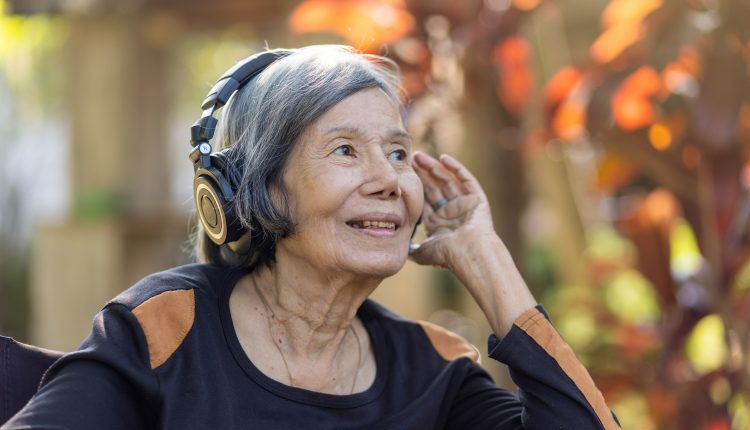
Best Music for Alzheimer’s Patients: A Caregiver’s Guide
Best Music for Alzheimer's Patients: A Caregiver's Guide
Think about a song that you love for a second. How far does it take you? How does it make you feel? Music’s emotional and cognitive benefits are well known, so it is not surprising that musical intervention offers therapeutic benefits to Alzheimer’s Patients. Playing familiar music for Alzheimer’s Patients can reduce agitation and help them communicate with their caregivers better.
Research suggests that music therapy for Alzheimer’s patients can provide emotional and behavioural benefits and even help with other types of Dementia.
Contents
- 1 The Effect of Music on Alzheimer’s Patients
- 2 The Purpose of Music Therapy for Alzheimer’s Patients
- 3 What Music Can Do to Improve Patient-Caregiver Communication
- 4 Alzheimer’s Caregiver’s Guide: Tips for Helping Patients Through Music
- 5 Work with a Trained Music Therapist
- 6 Think About your Loved One’s Preferences
- 7 Set the Mood
- 8 Avoid Over-stimulation
- 9 Encourage Movement
- 10 Sing Along with Them
- 11 Pay Attention to their Response
- 12 In Light of the Results, What Can We Conclude?
- 13 Final Words
The Effect of Music on Alzheimer’s Patients
Under the Centers for Disease Control and Prevention (CDC), Dementia is a condition in which memory and cognitive functions are impaired because of an illness or injury to the brain. There are many causes of Dementia, but Alzheimer’s disease is the most common. Here is more information about What Dementia is Disease?
There is a pattern to how Alzheimer’s disease spreads through the brain. This process begins in the parts of the brain responsible for memory and ends in the brainstem, which controls heartbeat, breathing, and swallowing. Long-term music memory remains intact until the disease attacks the brain stem in the late stages of disease progression. It is unknown why this area is least affected by Alzheimer’s disease. People with Dementia may benefit from musical intervention because it activates this part of the brain and stimulates other parts of the brain to improve mood and social engagement.
The Purpose of Music Therapy for Alzheimer’s Patients
Music Therapy is the clinical & research-based use of music interventions to accomplish specific goals by a licensed professional who has completed an official music therapy program. A variety of healthcare goals can achieve through music therapy interventions:
- Promote general Wellness
- Manage Tension
- Improve Communication
- Alleviate Pain
- Express Feelings
- Improve Memory
- Promote Physical Rehabilitation
Music therapy can help patients with mild cognitive impairment and mild Dementia. for more information, check out What Are the Differences Between MCI & Mild Dementia.
What Music Can Do to Improve Patient-Caregiver Communication
A recent study published in Alzheimer’s Disease and Associated Disorders focused on bridging the communication gap between caregivers and patients through music. Research on caregivers was unique because previous studies focused solely on the patient.
The findings indicate that music can benefit caregivers by reducing anxiety and frustration and lightening the mood. Additionally, music provides a way for caregivers to deeply connect with loved ones with Alzheimer’s disease — particularly those with difficulty communicating.
The study lead author explained that patients could connect with partners through music, something they could not do verbally.
Alzheimer’s Caregiver’s Guide: Tips for Helping Patients Through Music
Social engagement and communication are some of the difficulties people with dementia face. This fact can strain their relationships with their caregivers. People with Dementia may benefit from medications and lifestyle interventions to manage their symptoms. To learn more, check out A Guide to Understanding and Communicating with Dementia Patients.
In recent years, research has also focused on non-pharmacological interventions such as music therapy. Below are Alzheimer’s Caregiver’s Guide for helping Alzheimer’s patients through music:
Work with a Trained Music Therapist
Music for Alzheimer’s patients has superb effects. However, it is essential to remember not all memories connected to music are positive memories. A music therapist can work closely with your loved one to decide which types of music will elicit the best Response based on their background and taste.
Think About your Loved One’s Preferences
Does your loved one enjoy any particular genre of music? What music brings back memories of happy times in their life? Make a playlist with the help of family and friends and ask them to suggest songs. It is best if the person chooses the music.
Choose a music source without commercials, which can confuse listeners.
Set the Mood
During mealtimes or morning hygiene routines, play soothing music or sing a song to calm your loved one. Play upbeat or faster-paced music when you want to boost your loved one’s mood. A fast-paced piece from their childhood may lift their spirits.
Avoid Over-stimulation
If you are playing music, keep competing noises to a minimum. Make sure the TV is not on. Keep the door closed. You should adjust the volume based on the hearing ability of your loved one.
Encourage Movement
You can encourage your loved one to follow the beat by clapping or tapping their feet. You may want to consider dancing with them if it’s possible.
Despite Dementia’s best efforts, these foundational memories and songs remain locked in more bottomless vaults down windy mountain roads. A person might not recognize their spouse of 65 years, but when you play their wedding song, they turn to their spouse, recognize them and dance.
Sing Along with Them
Having a good time with your patient while singing along to music can boost your mood and improve your relationship over time. There is also some evidence that musical memory works differently than other types of memory and that singing may help stimulate these memories.
Pay Attention to their Response
It is a good idea to play particular songs frequently for your loved one if they seem to enjoy them. You can even search for similar music online and find a music style that seems most relevant. Choosing another type of music is suitable if your loved one reacts negatively to a specific song or piece.
In Light of the Results, What Can We Conclude?
The sensory experiences we have as humans relate to the memories we have. Often, even if other memory elements are impaired and impacted, those associations remain intact for people with Dementia or other cognitive impairments. Playing music for Alzheimer’s patients holds a lot of meaning and will trigger specific memories.
It is evident from the study mentioned above that music therapy is an essential part of dementia and memory care. And perhaps, music therapy for older adults should not be viewed as an adjunct or secondary care method but rather as a fundamental and primary one. This treatment is efficient and goes beyond what other treatments can offer in some ways.
Read more: Fun Questions to Ask Dementia Patients
Final Words
As the country’s population ages, one out of six people will be 65 and older by 2050. Although Alzheimer’s is not a normal part of aging, it has gained more attention globally in recent years. Music therapy for Alzheimer’s patients is an alternative and effective treatment in some cases of Dementia and can take place in several modalities. Therapy sessions can be one-on-one or in groups in homes or aged care facilities.


As a caregiver for my mother, who has Alzheimer’s disease, I have seen firsthand the power of music to bring her comfort, joy, and a sense of connection. This article on the best music for Alzheimer’s patients is spot on in its recommendations, and I have used many of these strategies myself. For example, I have found that playing music from my mother’s era, such as big bands or jazz tunes from the 1940s and 50s, can trigger memories and emotions that she might not be able to access otherwise. It’s also important to be attuned to her mood and energy level and adjust the music accordingly. Some days she might respond better to upbeat, cheerful music; other times, she might need something more soothing and relaxing. I have also found that singing along with her or encouraging her to move to the music can be a wonderful bonding experience for us both. Music truly is a universal language that can help bridge the gap between Alzheimer’s patients and their loved ones. I appreciate this caregiver’s guide to music and will be incorporating some of the suggested playlists and strategies into my daily routine with my mother.
Thank you for sharing this helpful guide on music for Alzheimer’s patients. I have a personal experience with this as my grandmother had Alzheimer’s, and we found that music was incredibly beneficial for her. Whenever we played her favorite songs, it was as if a switch had flipped, and she became more alert, engaged, and happy. It was a beautiful way to connect with her and bring joy to her life. Your article provides practical advice on how to use music to help those with Alzheimer’s, and I appreciate the helpful tips and resources you’ve shared. Music truly has the power to uplift and soothe, and I’m grateful for this reminder of its importance in caregiving.